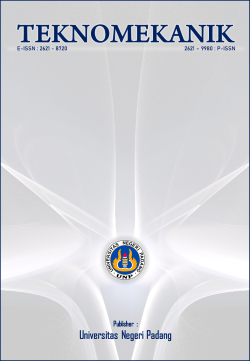Development of work based learning models in education of vocational midwifery: part of need analysis
DOI:
https://doi.org/10.24036/jptk.v3i2.9523Keywords:
Work Based Learning, Midwifery, Needs AnalysisAbstract
Skills in the world of work become demands that must be fulfilled by every education practitioner. Vocational education graduates produced by tertiary institutions do not have maximum competencies that are ready to be used for work, so there is often a gap between the competencies desired by graduates and the competencies produced by the education world. Educational literacy is needed to overcome this gap, one of them is by developing work-based learning models in midwifery vocational education. This study aims to analyze the needs of midwifery graduates, midwifery graduates 'recognition and midwifery lecturers' views on the general competency aspects of midwife graduates and work skills. This study involved five obstetricians from various institutions, five graduates working in various health institutions and five lecturers from various midwifery institutions. The results of the needs analysis showed that the low evaluation of midwifery users regarding the aspects of general competence and work skills of midwives in one year of work, so that the development of work-based learning models in midwifery education is very necessary to equate the desires of graduate users with the graduates produced. Furthermore, the resulting model will be tested effectively, valid and practical so that graduates can compete in the world of work.
Downloads
References
Achim, I., Popescu, T., Kadar, M., & Muntean, M.. (2013). Developing students’ educational experiences through work-based learning programmes. Procedia - Social and Behavioral Sciences, 93, 1045–1049. https://doi.org/10.1016/j.sbspro.2013.09.327
Arbayah, et al. (2012) Professional Midwife Attitude In Applying Standard Of Upbringing Normal Of Give Birth (APN) In Area General Harapan Insani Sendawar Hospital Kubar Regency.
Billett, S., Sweet, L., & Glover, P. (2013) The Curriculum and Pedagogic Properties of Practice-based Experiences: The Case of Midwifery Students. Vocations and Learning, 6(2), 237–257. https://doi.org/10.1007/s12186-012-9094-9
Brady, S., Bogossian, F., et al. (2013) A protocol for evaluating progressive levels of simulation fidelity in the development of technical skills, integrated performance and woman centred clinical assessment skills in undergraduate midwifery students. BMC Medical Education, 13(1), 1–7. https://doi.org/10.1186/1472-6920-13-72
Depkes RI. (2008). Besaran Kematian Ibu dan Anak.
Hutapea, R. (2011) Performance and Competence Determinants of Midwive in North Sumatera, East Nusa Tenggara, West Kalimantan, and South Sulawesi. Kesehatan Masyarakat Nasional, 6(1), 29–34.
Mardalena, D. (2009). Hubungan Motivasi dan Supervisi Dengan Kompetensi Bidan dalam Menanggulangi Perdarahan Postpartum Di Wilayah Kota Administratif Jakarta Selatan.
Putriana, Y. (2013). Community Midwifery Care Competencies Related To Implement of Care Community. Jurnal Penelitian STIKES Kediri, 5(2), 179–190. Retrieved from http://cpanel.petra.ac.id/ejournal/index.php/stikes/article/view/18614
Reza, M., Arani, S., Alagamandan, J., & Tourani, H. (2004). “Work-Based Learning: A Practical Approach for Learning to Work and Working to Learn-A Case Study on Decision-Makers’ Professional Development in Iran. Portugal University Press, 131–146
Schuh, G., Gartzen, T., Rodenhauser, T., & Marks, A. (2015). Promoting work based learning through Industry 4.0. Procedia CIRP, 32, 82–87. https://doi.org/10.1016/j.procir.2015.02.213
Thackrah, R. D., Thompson, S. C., & Durey, A. (2014). “Listening to the silence quietly”: Investigating the value of cultural immersion and remote experiential learning in preparing midwifery students for clinical practice. BMC Research Notes, 7(1), 1–12. https://doi.org/10.1186/1756-0500-7-685
WHO. (2011). Besaran Angka Kematian Ibu di Dunia.
Wise, R., Street, E., Axiotis, B., Moines, D., Bearden, M., Crookham-johnson, D.,Varner, J. IOWA (2017). Work-Based Learning Guide. emodul.
Downloads
Published
How to Cite
Issue
Section
License
Copyright (c) 2020 Hastuti Marlina, Nizwardi Jalinus, Fahmi Rizal

This work is licensed under a Creative Commons Attribution 4.0 International License.





